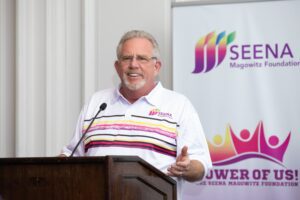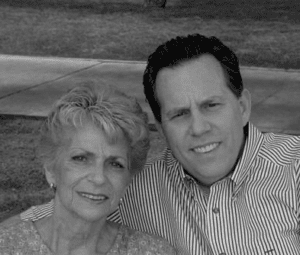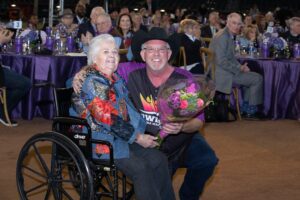Rare Community Profiles

Rare Community Profiles is a new Patient Worthy article series of long-form interviews featuring various stakeholders in the rare disease community, such as patients, their families, advocates, scientists, and more.
How the Seena Magowitz Foundation is Working to Change the World for People Living with Pancreatic Cancer
On paper, Roger Magowitz’s career experience may not seem like the obvious choice to lead a grassroots organization for pancreatic cancer. He is currently the Executive Vice President of Customatic Beds and has served as the Executive Director and Charitable Advisor of Mattress Firm for five years. Before that, Roger built his own business from the ground up, serving as President of Mattress Discounters in Virginia Beach for nearly 30 years.

His personal background drives him to meaningfully impact the lives of people with pancreatic cancer. Roger grew up in Brooklyn, NY and later served in the U.S. Marines. After losing his mother, Seena Magowitz, to pancreatic cancer in 2001, Roger became dedicated to leading a legacy of education, fundraising, and research for pancreatic cancer. That’s why he founded the Seena Magowitz Foundation, which has raised over $13 million to support innovative, life-extending treatments. Roger is committed to raising awareness and furthering research and hopes that the Seena Magowitz Foundation can continue to make a positive change.
JL: Hi Roger! Can you tell me a little more about yourself?
Roger: My name is Roger Magowitz. My world revolves around my wife, Jeanne, children, and grandchildren. I believe wholeheartedly that one person can make a difference, and one person can change the world. That’s why I feel privileged to be able to deliver hope to people going through the darkest moments of their lives. As I like to say, “If not me, then who?”
I do feel it falls on me and I am happy to take on that responsibility. Most recently, Furniture Today presented me with the 8th annual Lifetime Bedding Achievement Award at their Bedding Conference in Florida. It was an honor to be recognized for 35 years of leadership in the home furnishing industry, as well as my advocacy work and support of those working on and researching a cure for pancreatic cancer. I’m proud to be part of a close-knit community of advocates, medical advisors, and survivors working together towards a common goal.
I know that you founded the Foundation in honor of your mother. Can you tell me more about her? What impact did pancreatic cancer have on your lives?
My mother, Seena Magowitz, was a powerful and resilient woman. She was a single mother who worked tirelessly to provide for us. She instilled in us the value of hard work and the importance of giving back to the community. Growing up, my mother and grandmother were leaders of the “Friendly Group,” a charitable organization of family and close friends that raised funds for cancer research at Brookdale Hospital in Brooklyn, New York. Their dedication and passion for helping others left a profound impact on me.
In 2001, my mother was diagnosed with pancreatic cancer and given just months to live. It was a devastating blow to our family. Watching her rapid decline was heartbreaking, and I will never forget the unrecognizable symptoms that permitted the cancer to advance beyond any hope of survival. Few treatment options were available then, and it was incredibly frustrating and disheartening to watch.

My mother’s passing left an enormous void in my life but also gave me renewed purpose. I was determined to honor her legacy by doing everything in my power to support pancreatic cancer research.
I then founded the Seena Magowitz Foundation. There I was, the proud founder, when out of the blue, an amazing opportunity knocked on my door—I had the chance to sell my business to Mattress Firm.
I realized I had a golden chance to donate one million dollars in honor of my mom. To personally fund a massive sum to fight the very disease that took her away. My mom’s battle with pancreatic cancer opened my eyes to the desperate need for progress in this field. I knew I had to do something, not just for her, but for others facing a similar struggle. Writing that check felt surreal, but it was the most fulfilling thing I’ve ever done.
I haven’t stopped since. I’ve seen firsthand the urgency to step up the fight against this dreadful disease. I want to make a difference, to speed up the progress and be there for those who need it most. It’s about spreading hope and lending a hand to families going through the same rough journey my mom and I did.
What is pancreatic cancer? Any myths that you want to address?
As someone who has seen the devastating effects of pancreatic cancer firsthand, I can tell you it is an aggressive and formidable foe. Pancreatic cancer occurs when cells in the pancreas start to grow and divide uncontrollably, forming a tumor. It’s a particularly insidious disease because it often doesn’t present any symptoms until it has progressed to an advanced stage.
Some common symptoms of pancreatic cancer include jaundice (yellowing of the skin and eyes), abdominal pain or discomfort, unexplained weight loss, loss of appetite, the sudden onset of type 2 diabetes, nausea, and vomiting. However, these symptoms can be easily mistaken for other conditions, challenging early detection and diagnosis.
One of the biggest myths about pancreatic cancer is that it is always a death sentence. While it is true that pancreatic cancer has a very low five-year survival rate, especially when detected in later stages, it is essential to remember that there are survivors who have beaten the odds. With early detection, surgery, and other treatments, some patients can achieve long-term remission and a complete cure.
I also want to address the misconception that pancreatic cancer only affects older people or men. While it is true that the disease is more common in people over the age of 50 and in men, anyone can develop pancreatic cancer. Therefore, it’s essential for people of all ages and genders to be aware of the symptoms and risk factors and to talk to their doctor if they have any concerns.
So, what is the Seena Magowitz Foundation?
The Seena Magowitz Foundation is a non-profit organization with a mission to raise awareness and fund medical research for the treatment of pancreatic cancer. We strive to be the loudest voice for pancreatic cancer and have been funding research for over 20 years. Our team consists of five people. Two of them are paid employees, hired during COVID. The other three have been working pro-bono since inception tirelessly to ensure every donation is used effectively and efficiently. We have no brick-and-mortar. Everyone works remotely to help reduce overhead costs and make sure donor dollars are going toward the cure.
Our commitment to making personal connections with patients and their families sets us apart from other organizations. For example, we have a pancreatic cancer support community called Pancreatic Cancer SOS (Support fOr Survivorship), where patients can find support from others who understand what they are going through. We also have a monthly podcast where we interview top medical experts on various aspects of treatment and coping with the disease. Additionally, we highlight the stories of our warriors and ambassadors in the fight against pancreatic cancer.
We believe in getting a second opinion and can connect patients with leading specialists and resources to facilitate this. We also encourage patients and their families to share their stories as a powerful way to inspire others and raise awareness about pancreatic cancer.

At the Seena Magowitz Foundation, we are deeply committed to making personal connections with individuals affected by pancreatic cancer. As the founder, I take the initiative to make personal calls, and patients and their families are always quite surprised. I know that this is not the typical operation of the CEO, but I believe that it makes people feel like a part of our family. We operate on a grassroots level because we believe in the power of personalized support and providing everyone with attention and assistance. We want to help and connect people as quickly as possible to the right institutions, doctors, and treatments to provide them with the best care and support.
In today’s world, everything is “call this number, press two, and wait for 30 minutes,” to talk to someone. Because of our personal connections, we can streamline that process. This makes a world of difference when a patient is in their darkest days, and they can hear a compassionate voice on the other line that same day.
We understand that navigating the complexities of pancreatic cancer can be overwhelming, and we are here to provide guidance, resources, and connections, in a caring and compassionate way, to help individuals along their journey.
Another thing that sets the Seena Magowitz Foundation apart is our extensive network of pancreatic cancer patients and survivors who have achieved long-term remission, which is almost unheard of for this type of cancer. Our network spans the United States and includes 77 warriors, of whom 40 have surpassed the 5-year survival mark, 31 have surpassed the 10-year survival mark, and 6 have even surpassed the 20-year survival mark. We are incredibly proud of this achievement, and we know many more patients are out there. We would love to connect with them and help them tell their story. These stories bring hope. We want to raise awareness and fund research to help even more patients achieve long-term survival.
Additionally, Dr. Daniel Von Hoff has been our mentor. Somehow, we’ve been able to team up with the most distinguished leader in pancreatic cancer research. He’s one of the most hard-working dedicated people in fighting this disease. And he’s ignited the flame in us, and in turn those around us and involved. He’s opened the world to us and guided us on funding the most pressing and important clinical trials. He created our connection with Dr. Douglas Evans, who is equally as passionate and committed to the cause. He is a world-renowned chief of surgery at the Medical College of Wisconsin. Those doors of opportunity have surrounded us with great doctors and their work has saved hundreds of lives. These doctors are setting the bar for young up-and-coming researchers with a desire to make a change.
How does the Foundation support patients? What resources are offered?
Our primary focus is supporting pancreatic cancer patients and their families. That is where our hands-on grassroots approach comes into play. Our patients are at the center of everything we do, and we offer a variety of resources to help them navigate their diagnosis and treatment options. We believe patient outcomes should always be the center of our attention, so we offer guidance, research, networking, and resources to support pancreatic cancer patients.
One of the ways we support patients is through our virtual support group, The Seena Magowitz SOS (Support fOr Survivorship) group, launched in 2023. This dedicated group focuses on patient wellness, hope, and inspiration and is aimed at helping patients live life to the fullest extent possible. We also offer year-round support and community to pancreatic cancer patients, doctors, and caregivers through various events and activities, including our highly anticipated annual event.
In addition, we connect patients to other survivors who have gone through similar experiences, such as 29-year-survivor Kay Kays and approaching 5-year-survivor Michael Francis. We are committed to making personal connections and helping patients find the right institutions, doctors, and treatments as quickly as possible. Michael Francis, as a survivor, even brought his brother, Dr. Perry Francis, on board to moderate our patient support group meetings. Dr. Perry is a counseling professor and the Counseling Training Clinic coordinator in the College of Education Clinical Suite. He is our full-time moderator and mentor pro-bono for the support group meetings. These personal connections can be incredibly powerful and provide hope and inspiration to patients and their families during difficult times. We try wherever possible through our connections to get highly regarded and skilled individuals to help us pro-bono, which is impactful to the cause.
What research does the Seena Magowitz Foundation contribute to?
I am proud to say that we have contributed to significant breakthroughs in pancreatic cancer treatment, management, care, diagnostics, and prevention. Every dollar we raise goes directly to funding pilot and clinical trials for pancreatic cancer, and our organization has raised over $13 million for this purpose. This funding has primarily supported Pilot Studies and Phase 1 Studies, leading to over $150 million in additional funding for expanded phases of respective clinical trials. One of the trials we supported (gemcitabine + abraxane) was just added to the NCCN guidelines and is considered the Gold Standard of Care. Our Medical Advisory Board carefully selects the trials we fund, and we are grateful for the guidance of experts like Dr. Daniel Von Hoff and Dr. Douglas Evans. We are dedicated to continuing our efforts to advance pancreatic cancer research and provide hope to patients and their families.
The Grand Slam clinical trial (PI: Erkut Borazanci) was the 5-drug clinical trial for metastatic pancreatic cancer. This trial treated 35 patients and 83% of those patients saw at least a 30% shrinkage of their tumor (partial response) with a 1-year survival rate of 68%. This was much higher than historical figures with just gemcitabine + nab-paclitaxel but wasn’t significantly different from the three-drug combination (gem+nab-pac+cis). Dr. Borazanci is working on writing up a manuscript outlining the study findings. This trial was the building block for the Kryptonite trial that is presently being written up. We believe the immune-oncology agent in this study had anti-tumor activity.
We are also working with Dr. Douglas Evans regarding funding a 2023 clinical trial with the net proceeds of this year’s event. Dr. Evans is very excited and is working with his team to see what is most needed to innovate and attack Pancreatic Cancer. The Medical College of Wisconsin will conduct the trial, and a shared study is open at HonorHealth in Scottsdale, Arizona.
Neoadjuvant surgery (e.g., chemotherapy before surgery) is becoming the preferred treatment strategy for patients with supposedly localized pancreatic cancer (but it is microscopically already all over the body). We are performing a study at the Medical College of Wisconsin (MCW) in Milwaukee and HonorHealth in Scottsdale to identify the molecular subtypes of cancer before treatment. This personalizes the neoadjuvant therapy (FOLFIRINOX vs. gemcitabine+Abraxane) based on the molecular characteristics of each patient’s tumor. Half of the patients have been accrued and we hope to have full enrollment by August 2024.
Finally, we are working with Drs. Han and Von Hoff; with our funding in the laboratory, we have found a way to “expose” tumor cells to our immune system so that killer T cells can destroy the pancreatic cancer, which is normally able to “hide.” The target to do that is transcription factor II H (TFIIH). Thanks to the findings in the lab, we have written a clinical trial to put those findings to work against the disease. We are anxious to move forward with this highly new approach against pancreatic cancer.
Ideally, what research would you like to see on pancreatic cancer in the future?
As someone who has dedicated their life to finding a cure for pancreatic cancer, I would ideally like to see more research in all areas of this disease. It cannot just be fought with just one line of research. Focusing on early detection methods is essential, but treatments and care are still necessary, even with early diagnoses. One area that we are particularly passionate about is making early-detection blood tests more widely available. We were one of the first foundations to bring the first blood test dedicated to the early detection of pancreatic cancer to patients at our event. The IMMray PanCan-d test measures 9 serum biomarkers, including CA19-9, that when combined in an algorithm is able to detect pancreatic ductal adenocarcinoma. We hope that everyone will eventually have free or significantly reduced costs to access it. Ultimately, our goal is to see significant improvement in patient outcomes and survival rates.
Why is it important to raise pancreatic cancer awareness?
Unfortunately, many times we lose patients that would become advocates. And the families are so devastated, they don’t want anything to do with the disease. It’s hard for them to want to engage in awareness and fundraising. As someone who has seen firsthand the devastating impact of pancreatic cancer, I firmly believe that raising awareness about this disease is crucial. Pancreatic cancer is a highly lethal cancer with a low survival rate, and it receives far less funding and attention than other cancers. Without greater awareness, we cannot anticipate the tools and support required to assist those who are suffering. According to the American Cancer Society, an estimated 64,050 people will be diagnosed with pancreatic cancer in the United States in 2023, and about 50,550 people will die. These numbers highlight the urgent need to raise awareness and fund research that can improve treatments and outcomes. In addition, pancreatic cancer accounts for about 3% of all cancers in the US and about 7% of all cancer deaths. With these statistics in mind, it is clear that pancreatic cancer awareness, research, and advancement should be top priorities across research and healthcare facilities.

If you had any advice to give to those who are newly diagnosed, what would you say?
Avoid the internet in those early days. The internet can be overwhelming and filled with outdated information that may cause unnecessary fear. Instead, reach out to us first. As a foundation, we have close personal relationships with the top medical teams across the nation. Through our extensive network, we can connect you with leading experts who specialize in pancreatic cancer. Additionally, we have a strong community of over 77 warriors—individuals who have walked in your shoes and are ready to offer support, guidance, and hope. We’re here to provide you with the right resources and a compassionate ear during this challenging time.






